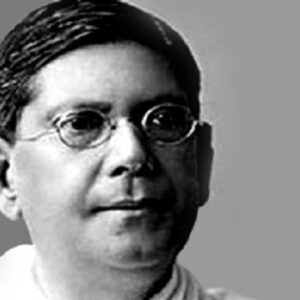Chittaranjan Das was one of the most famous politicians and nationalists in Bengal during a very important time of political and ideological change in Bengal. Das became a symbol of patriotism and bravery during the Non-Cooperation movement. He was the first person to stop buying anything British, even clothes. Das was a lawyer by trade, and he became well-known when he returned to India after finishing his studies abroad, started a law practice, and defended the great Sri Aurbindo Ghose in a court case brought against him. Soon after he stopped practicing law, he got involved in the nationalist movement. His political vision, foresight, tact, and speaking skills helped him become the leader of the Congress party in Bengal. He worked hard in Gandhi’s Non-Cooperation movement and even went to jail for it. But when the movement failed, he lost hope. He came up with a plan to end dyarchy, but Congress didn’t like it, so he and Motilal Nehru started their own party, the Swarajya Party. Because he was so sure that India should be able to run itself, people called him Deshabandhu.
Early years and childhood
Chittaranjan Das was born in 1870 in Bikrampur, Dhaka, which is now Bangladesh. His father, Bhuban Mohan Das, was a member of the famous Das family of Telirbagh. His lawyer and journalist father used to be the editor of the English Church Weekly, The Brahmo Public Opinion.
Chittaranjan Das’s Career
Das finished his studies at the Presidency College in Kolkata in 1890, and then he went to England to continue his education. He wanted to take the rest of his civil service exam there. Even though he didn’t do well on the tests, he joined the Inner Temple and was called to the bar.
He worked as a lawyer for a long time, but he didn’t become well-known until 1909 when he defended Sri Aurobindo Ghose, a famous nationalist leader at the time. Ghose was accused of having something to do with the bomb case in Alipore.
From the start, he was a nationalist, and he joined the Students’ Association at Presidency College in Kolkata. From 1917 to 1925, he worked in politics.
During this time, he was in charge of the Bengal Provincial Conference and came up with a plan for rebuilding villages by setting up local self-government, cooperative credit societies, and bringing back cottage industries. He also began going to meetings of the Indian National Congress.
With his skills in public speaking, political vision, and diplomacy, he quickly rose to become a key leader in Congress. In 1920, he joined Mahatma Gandhi’s Non-Cooperation Movement.
He was arrested in 1921, along with his wife and son, for taking part in the Non-Cooperation Movement. They were all sent to prison for 6 months. After that, the Ahmedabad Congress chose him to be its leader. Das came up with a new plan to end diarchy after the Non-Cooperation movement failed.
His plan was turned down by almost everyone in Congress. That’s why he and Motilal Nehru started the Swarajya Party. In Bengal, the party was a big hit, and in 1924, it won most of the seats in the legislative councils. Das was the first person to be elected mayor of Kolkata by the people.
In the same year, Das wrote down his well-known “Communal Pact” to help Hindus and Muslims in India get along.
Personal History and Legacies
Das married Basanti Devi in 1879, and they had three children: Aparna Devi, Chittaranjan Das, and Kalyani Devi. Basanti was also an independent freedom fighter who joined the movement for freedom.
In 1925, Das’s health started to get worse, so he went to his mountain resort in Darjeeling to rest. He died because he had a very high fever. The funeral procession for Mahatma Gandhi was led by him.
Estimated Net worth
Chittaranjan Das’s estimated net worth is $2 million, and he makes most of his money as a politician, lawyer, and author. We don’t have enough proof about Chittaranjan Das’s cars or his way of life.
Trivia
Gandhi said in public at the time of his death, “Deshbandhu was one of the greatest of men… He dreamed of India’s freedom and talked about nothing else. His heart didn’t know the difference between Hindus and Mussalmans. I’d also like to say that he didn’t dislike English.
His wife, Basanti Devi, is also known for her work in the freedom struggle. Netaji Subhas Chandra Bose called her “Ma” and said that she was a great leader.
Chittaranjan Avenue, Chittaranjan College, Chittaranjan High School, Chittaranjan Locomotive Works, Chittaranjan National Cancer Institute, Chittaranjan Park, Chittaranjan Station, Deshbandhu College for Girls, and Deshbandhu Mahavidyalaya are all named after him to honor his memory.
Deshbandhu’s literary magazines Narayan, Mala, Sagar Sangit, Kishore-Kishore, and Antaryami show that he was always good at writing.
He worked with Bipin Chandra Pal and Aurobindo Ghose to make the English-language weekly Bande Mataram, which spread the idea of swaraj.


